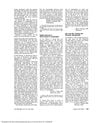 September 2024 in “Journal Of Social Sciences And Humanites”
September 2024 in “Journal Of Social Sciences And Humanites” A combined approach of medical treatments, natural remedies, diet, and stress management is best for hair regrowth in Cambodia.
 August 2023 in “International Journal For Multidisciplinary Research”
August 2023 in “International Journal For Multidisciplinary Research” Ayurvedic treatment, exercise, and a healthy diet can effectively manage PCOD symptoms.
 August 2023 in “Physician's journal of medicine”
August 2023 in “Physician's journal of medicine” Hashimoto thyroiditis is an autoimmune disease that can lead to an underactive thyroid and is treated with medication and sometimes diet changes or surgery.
 August 2016 in “Journal of evolution of medical and dental sciences”
August 2016 in “Journal of evolution of medical and dental sciences” Most acne patients were young males with face acne, with many experiencing worsening in summer and diet-related aggravation.
 October 1997 in “Baylor University Medical Center Proceedings”
October 1997 in “Baylor University Medical Center Proceedings” Obesity in the U.S. is largely influenced by diet and exercise, certain medications can improve heart procedures and hair growth, and major teaching hospitals have better patient outcomes.
 99 citations,
December 2010 in “Journal of The European Academy of Dermatology and Venereology”
99 citations,
December 2010 in “Journal of The European Academy of Dermatology and Venereology” The document concludes that certain genetic mutations and dietary factors are involved in acne development, and treatments like isotretinoin and diet changes can help manage it.
 18 citations,
July 2001 in “Australian veterinary journal”
18 citations,
July 2001 in “Australian veterinary journal” A cat with skin bumps and itching had high blood fats and skin infections, which improved with diet and medication changes.
 9 citations,
August 2007 in “Journal of animal science/Journal of animal science ... and ASAS reference compendium”
9 citations,
August 2007 in “Journal of animal science/Journal of animal science ... and ASAS reference compendium” Sheep wool follicles absorb different amino acids at various rates and locations, which could affect wool growth based on diet and genetics.
9 citations,
October 1946 in “Experimental biology and medicine” Rats fed soybean oil meal lost hair, but adding inositol, biotin, cystine, or methionine to their diet prevented this and improved growth.
 2 citations,
July 1998 in “Dermatologic Clinics”
2 citations,
July 1998 in “Dermatologic Clinics” European dermatologic treatments focus on lifestyle and psychosocial factors, use diverse methods like baths and climate therapy, and emphasize the importance of diet and supplements for skin health.
 2 citations,
January 1997 in “Principles of Medical Biology”
2 citations,
January 1997 in “Principles of Medical Biology” Drug metabolism affects how long a drug works, its interactions, activation, and toxicity, and is influenced by genetics, diet, illness, and other drugs.
 1 citations,
December 2023 in “Environmental pollution”
1 citations,
December 2023 in “Environmental pollution” Hair analysis shows infants and mothers in north-western Spain are exposed to environmental pollutants, with factors like diet and residence affecting pollutant levels.
 1 citations,
July 2023 in “Frontiers in Immunology”
1 citations,
July 2023 in “Frontiers in Immunology” Oxidative stress and immune dysfunction are linked to both Hashimoto's thyroiditis and polycystic ovary syndrome, with diet and specific treatments important for managing these conditions.
 1 citations,
January 2006 in “Elsevier eBooks”
1 citations,
January 2006 in “Elsevier eBooks” Cats lose fur due to various reasons, including allergies, infections, genetics, hormones, diet, cancer, stress, and some conditions are treatable while others are not.
 August 2024 in “International Journal of Medicine”
August 2024 in “International Journal of Medicine” COVID-19 can cause hair loss, and managing it involves counseling, diet changes, and treatments.
 April 2024 in “International journal of medical science and clinical research studies”
April 2024 in “International journal of medical science and clinical research studies” Effective acne management in PCOS includes hormone therapy, metformin, isotretinoin, weight loss, diet, exercise, and personalized treatment plans.
 March 2024 in “Animal nutrition”
March 2024 in “Animal nutrition” Adding both soluble and insoluble fibers, especially beet pulp, to the diet of pregnant sows helps improve their health and the growth of their piglets in hot weather.
 October 2022 in “Southeast Asian journal of health professionals”
October 2022 in “Southeast Asian journal of health professionals” Hair greying is seen as a sign of aging; temporary fixes like hair dye are used, but a balanced diet and hair care can help manage it.

Many young women have Polycystic Ovarian Syndrome (PCOS), which is often linked with irregular periods, depression, low self-esteem, and insomnia. Lifestyle and diet changes, along with regular counseling, can help manage these symptoms.

Lifestyle factors like BMI at young adulthood can increase cancer risk in women with Lynch Syndrome, but diet and height don't seem to affect this risk.
 October 2016 in “Journal of the Dermatology Nurses’ Association”
October 2016 in “Journal of the Dermatology Nurses’ Association” Polycystic Ovary Syndrome (PCOS) affects 6%-15% of women of reproductive age, causing symptoms like acne and hair loss, and increasing the risk of type 2 diabetes and heart disease; it's managed through diet, exercise, and medications like Metformin and hormonal contraceptives.
 September 2016 in “Princeton University Press eBooks”
September 2016 in “Princeton University Press eBooks” The document concludes that understanding health requires considering evolutionary perspectives on reproductive fitness, and recognizing the complexity of factors like diet, testosterone, and sexual orientation.
 January 2006 in “Elsevier eBooks”
January 2006 in “Elsevier eBooks” Cats with Feline Symmetrical Alopecia can regrow hair with proper treatment based on the specific cause, including diet, medication, or stress management.
 July 1976 in “Archives of Dermatology”
July 1976 in “Archives of Dermatology” Some people may naturally have beaded lines on their skin that are more visible with certain treatments, and hair loss similar to post-pregnancy can occur after specific diet and therapy.
 September 2002 in “Dermatologic Surgery”
September 2002 in “Dermatologic Surgery” Male pattern baldness affects 38.52% of Asian men in Bangkok, increasing with age and possibly linked to environment and diet.
 198 citations,
July 2011 in “Cochrane library”
198 citations,
July 2011 in “Cochrane library” Lifestyle changes can improve body composition, excess male hormone levels, and insulin resistance in women with PCOS.
 70 citations,
April 2013 in “Endocrine”
70 citations,
April 2013 in “Endocrine” Lifestyle changes improve metabolism and fertility in overweight PCOS patients; anti-obesity drugs show potential but need more research.
38 citations,
September 2017 in “Journal of zoo and wildlife medicine” Oclacitinib maleate successfully treated alopecia in Andean bears.
 37 citations,
June 2021 in “Journal of the European Academy of Dermatology and Venereology”
37 citations,
June 2021 in “Journal of the European Academy of Dermatology and Venereology” Adult skin quickly reacts to short-term environmental and internal stress, leading to various skin issues and the need for protective measures.
 26 citations,
September 2002 in “Dermatologic Surgery”
26 citations,
September 2002 in “Dermatologic Surgery” Male pattern baldness affects 38.52% of Asian men in Bangkok, increasing with age and influenced by genes and environment.




























